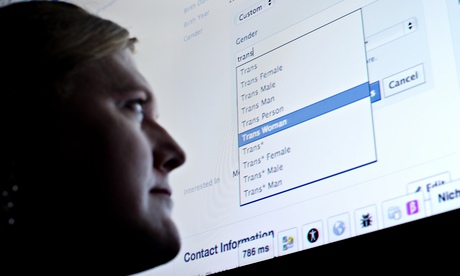
Two cheers for Facebook, who have just expanded their personal gender options from the somewhat limiting binary of male and female to an eye-watering 50 plus descriptions. Now you can plump for trans (– male, – female or – person) to indicate some variance between gender assigned at birth and identified gender, or simply trans*, which covers pretty much all bases under the "trans umbrella".
There are also variants of genderqueer (any gender outside male/female); genderfluid (moving between genders); non-binary (an umbrella descriptor for all genders that are not simply male or female), two spirit and pangender (rejecting singular gender); and agender (rejecting gender altogether). Also provided is intersex, which covers individuals whose sexual characteristics do not map to stereotypes of male or female.
Of course, there's criticism already. The first I heard of this was courtesy of a comment by an online friend, who expressed frustration that Facebook had not included their preferred gender option: non-gendered identity. In addition, Facebook still gives precedence to the gender binary: its online presentation takes the form of male, female or the choice of 48 "custom" categories. Others have objected that its attempt to provide equal personalisation when it comes to pronouns is rudimentary – one can choose to be referred to as her, him, or them – and the relationship options (both romantic and familial) remain steadfastly gender normative.
I foresee trouble too with Facebook's insertion of various categories of cis(gender), a term more frequently used by some in the trans community to define non-trans people than an identity opted for: a few non-trans people actively object to it. Though presumably if someone does self-identify as cis, that's OK.
Of course, that is teething trouble. The options are so far only accessible to those select English (US), and this scheme has all the hallmarks of beta version.
More fundamental, though, are issues with Facebook kicking off a conversation about gender with trans and gay groups, while omitting one significant voice: women. Gender – and the politics thereof – have long been central to feminist discourse. Societal gendering of pretty much everything, from toys and games, through to the ads that pop up on your timeline, is a live issue. Many women have deliberately selected "male" as the only way to remove a succession of tiresome ads for wrinkle cream and diet products from their timeline.
Analysis of data use in the UK suggests that gender is rarely helpful – except in a marketing context. It would be unkind to suggest that Facebook has opted to garner politically correct headlines, while not even contemplating removing gender altogether, which might interfere with its commercial activities, wouldn't it?

